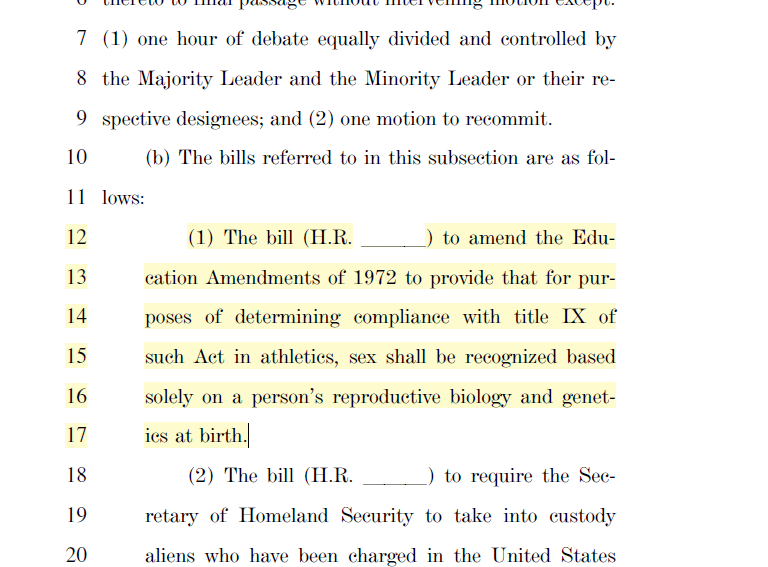Download audio: https://ondemand.npr.org/anon.npr-mp3/npr/me/2025/01/20250124_me_london_hacking_hearing.mp3?size=3379245&d=211173&e=nx-s1-5271530
Download audio: https://ondemand.npr.org/anon.npr-mp3/npr/me/2025/01/20250124_me_london_hacking_hearing.mp3?size=3379245&d=211173&e=nx-s1-5271530
On Tuesday, the House of Representatives took one of its first major votes of 2025: a decision on whether transgender people should be banned from participating in sports according to their gender identity and transition status. The far-reaching bill, affecting sports as varied as dancing, darts, and chess, included no enforcement mechanism, raising concerns about invasive investigations such as genital exams for students suspected of being transgender. In response, Democrats unified against the bill, reframing it during debate as the "GOP Child Predator Empowerment Act" to emphasize the dangers of intrusive enforcement and targeting of children. Though the bill ultimately passed the House, the near-party-line Democratic opposition increases the likelihood that it will fail in the Senate, where it faces a steeper filibuster threshold.
The bill itself stipulates that “sex shall be recognized based solely on a person’s reproductive biology and genetics at birth.” It prohibits transgender female participation by barring “recipients of Federal financial assistance who operate, sponsor, or facilitate athletic programs or activities” from allowing “a person whose sex is male to participate in an athletic program or activity that is designated for women or girls.” If passed, the legislation would result in the immediate outing and exclusion of transgender athletes in sports programs at schools and colleges across the United States. Moreover, it would mark the first instance in recent U.S. law where transgender individuals are explicitly defined as not legally belonging to the gender with which they identify, as recognized by their identification documents and court rulings.
As the bill’s first hearing approached, speculation mounted over how Democrats would respond, particularly in light of their recent vote on the NDAA, which included a provision banning Tricare from covering gender-affirming care for the children of military service members. Those concerns were swiftly put to rest when Congressman Takano took the floor, holding up a sign emblazoned with the words “The GOP Child Predator Empowerment Act.” He declared that the bill “opens the door to invasive physical examination of children who simply want to play softball or basketball,” signaling a unified and pointed Democratic opposition.
What followed was a series of Democratic representatives hammering the same point home with fiery rhetoric. Representative Alexandria Ocasio-Cortez railed against the notion that the bill was about protecting women and girls, stating, “Republicans, who have voted consistently against the Violence Against Women Act, who have taken the rights of all women to have control over their own body, who as women are bleeding out in parking lots, now want to pretend today that they care about women… And why? To open up genital inspection on little girls across this country in the name of attacking trans girls. We have two words. Not today.”
You can watch her speech here:
Representative Sarah Jacobs concurred and even pointed to a real world example of invasive investigations on a cisgender girl’s gender identity after being accused of being trans by members of the losing team, stating, "This bill puts all women and girls in danger of sexual abuse. We have already seen an investigation like this at a high school in Utah, and unsurprisingly, they targeted someone who wasn't trans"
Once the hour of debate concluded, the bill narrowly passed with 218 votes, just above the required threshold. Only two Democrats, Representatives Henry Cuellar and Tony Gonzales of Texas, voted in favor of the bill, while Representative Don Davis of North Carolina voted present. These numbers fell far short of the 81 Democrats who supported the NDAA bill, signaling that pressure from LGBTQ+ constituents and advocacy campaigns leading up to the vote may have successfully influenced representatives on this contentious issue. The outcome is promising for the Senate, where Republicans will need at least seven Democratic votes to overcome a filibuster, making it increasingly unlikely that the bill will advance further.
Attacks on transgender people are anticipated to escalate during Trump’s presidency, with the incoming president-elect pledging 100 executive orders on his first day in office. Among these, it is expected that several will target transgender individuals in schools, the military, and potentially in sports. However, by mounting resistance to anti-trans legislation, Democrats may slow the pace of these attacks, creating opportunities to tie them up in court. Importantly, executive orders, while harmful, are generally easier to reverse under future administrations compared to entrenched legislative changes, making this resistance critical for the long-term protection of transgender rights.
In recent weeks, anxiety has grown among transgender advocates over a potential shift within the Democratic Party. Following the 2024 election, a handful of Democratic representatives signaled a willingness to capitulate on transgender issues, a concern amplified by the swift passage of a military spending bill that included a provision targeting the transgender children of military service members—legislation that garnered significant Democratic support. With more anti-trans bills expected to surface in the coming months, fears of Democratic defections came to a head this weekend when New Jersey Democratic State Senate Deputy Majority Leader Paul Sarlo, in a stunning departure from party norms, referred to transgender women as men and endorsed banning them from participating in women’s sports during an interview with Steve Adubato on PBS.
“When asked the question, should men who... or people who were previously men or born as a man… who transitions to be a woman, that they should not compete in women’s sports, why is that a controversial issue that so many of your Democratic colleagues couldn’t give a straight answer to… no, we should protect women in sports and women should compete against women… that is some radical position?” the host, Steve Adubato, asked of the Senator.
Senator Sarlo responded, “The Democratic Party failed miserably. It’s very simple, males shouldn’t be participating in women’s sports, whether it’s at the rec level, the high school level, the collegiate level, period. That’s the end.”
Adubato followed up, “Alright, but I will say this. Some of your colleagues on the far… the progressive wing of the party are not only uncomfortable saying that, they will not say that.”
Sarlo interjected, “I’m not afraid to say it. I feel strongly about that, and I think if we just talked a little bit more straight up, have a little more practical common sense, we could have done better at the polls. Hey, elections have consequences.”
You can watch the exchange here:
Senator Sarlo’s remarks arrive at a time when the Democratic Party is facing internal soul-searching over its stance on transgender rights. Last month, a military funding bill included an anti-trans provision barring Tricare from covering gender-affirming care for the transgender children of servicemembers. That bill passed the House with the support of 81 Democrats. In the Senate, Senator Tammy Baldwin (D-WI) led an effort to strip the anti-trans provision through an amendment, but only 24 Senate Democrats co-sponsored it. Majority Leader Chuck Schumer (D-NY) ultimately requested the amendment be withdrawn, avoiding a full Senate vote and preventing Democrats from having to go on the record regarding their support for transgender youth.
The party will face a tougher reckoning in 2025, as Republican House Speaker Mike Johnson has named a transgender sports ban as the top legislative priority. The privileged bill, set to be heard on Tuesday, will compel Democrats to take a clear stance on transgender rights: stand firm in support or capitulate, betraying their trans constituents who overwhelmingly vote Democratic. The bill could be blocked in the Senate if Republicans fail to secure seven Democratic votes to break a filibuster. However, sources tell Erin In The Morning that the vote is expected to be razor-thin, with enough Democrats potentially willing to bargain away transgender rights, putting the outcome in serious question.
Though Sarlo frames a trans sports ban as “common sense,” its implementation reveals a far more indiscriminate reality. While most discussions center on high-profile cases in sports like swimming, trans sports bans operate as a blunt instrument, impacting a wide range of activities where the concept of athletic advantage is irrelevant. Transgender individuals could be banned from participating in darts, pool, fishing, and dancing—activities where gender offers no competitive edge. Even chess is not spared; international controversy erupted when FIDE, the global chess organization, ruled that transgender women could not compete in women’s chess leagues, showcasing the absurdity and overreach of such policies.
For transgender activists and Democrats supporting transgender rights, leaders like Senator Sarlo represent a significant threat to LGBTQ+ people. History shows that targeting transgender sports is often the first domino in a larger torrent of anti-trans legislation. These attacks rarely stop at sports; they tend to spiderweb into every aspect of transgender people’s lives, from healthcare to legal recognition to public accommodations. For those in New Jersey, contacting your Democratic Senator or Representative is crucial. You can enter your address on Datamade here to make your voice heard and let them know where you stand.

After Mike Johnson’s election as Speaker of the House, Republicans unveiled their top legislative priorities for 2025. Leading the list was a bill targeting transgender participation in sports—a measure so expansive it could impact everything from team sports to activities like dancing, darts, and even chess. On Tuesday, the House is set to take up the bill, with a Senate vote anticipated shortly thereafter. If enacted, the legislation would have immediate and far-reaching consequences: transgender individuals could be barred from participating in sports, forced to publicly out themselves, and face the erosion of legal recognition for their gender identity in broader aspects of U.S. law.
When asked about the bill’s prospects, sources familiar with the proceedings described the Senate vote as “close.” With a 60-vote threshold required, it remains unclear how many Democrats will support banning transgender participation in sports, but enough are considering doing so to bring the vote down to the wire. This vote will mark the first major direct congressional vote on transgender issues for many of the elected officials. Republicans appear poised to replicate a strategy that has driven the passage of hundreds of anti-trans laws and policies in recent years: begin with sports bans, normalize denying the legitimacy of transgender identities, and expand to restrictions in broader aspects of life.
Democrats have largely managed to sidestep taking direct, floor-wide votes on transgender issues post-election. During the passage of the National Defense Authorization Act, an anti-trans provision barring the children of U.S. service members from receiving coverage for gender-affirming care was included in the final legislation. The bill passed with the support of 81 Democratic House members and was signed into law by President Biden, marking the first national anti-transgender law enacted in the modern wave of legislative attacks on transgender rights in the United States. While the transgender provision was just one small part of a broader budgetary bill—a strategy Republicans are likely to replicate in future fights—the precedent it sets is significant. A Senate vote to strip the provision was blocked by Democratic leadership, signaling that Democrats may be on the brink of conceding on transgender issues even in the one chamber where they currently hold enough power to offer meaningful protection.
The bill, set for a hearing on Tuesday, stipulates that “sex shall be recognized based solely on a person’s reproductive biology and genetics at birth.” It prohibits transgender female participation by barring “recipients of Federal financial assistance who operate, sponsor, or facilitate athletic programs or activities” from allowing “a person whose sex is male to participate in an athletic program or activity that is designated for women or girls.” If passed, the legislation would result in the immediate outing and exclusion of transgender athletes in sports programs at schools and colleges across the United States. Moreover, it would mark the first instance in recent U.S. law where transgender individuals are explicitly defined as not legally belonging to the gender with which they identify, as recognized by their identification documents and court rulings.
While the bill is expected to impact sports that have become hot-button issues for conservatives, such as swimming and volleyball, it is also poised to have far-reaching—and perhaps intended—consequences for other areas of competition. The legislation prohibits athletic associations from making case-by-case judgments for competitive fairness and instead imposes a blanket ban on transgender participation. This sweeping approach means transgender individuals could be excluded from activities such as darts, billiards, dancing, disc golf, fishing, and other sports where claims of unfair advantage are tenuous at best. Even chess—recognized as a sport by multiple universities—could fall under the bill’s scope, echoing a recent move by FIDE, the international chess organization, to bar transgender women from women’s chess competitions. Notably, each of these sports has seen targeted attacks from Republicans in recent years.
Attacks on transgender participation in sports are part of a calculated strategy by far-right Christian conservatives to erode every aspect of transgender legal recognition. Far from being an endpoint, these bills are intended as a stepping stone for broader anti-transgender policies. Democrats capitulating by supporting such legislation will not mitigate these attacks—it will embolden them, establishing a dangerous precedent by denying transgender people legal recognition of their gender identity.
Terry Schilling, leader of the American Principles Project, openly outlined this strategy in a CNN interview, admitting that the focus on sports was never the true goal. “The women’s sports issue was really the beginning point in helping expose all this because what it did was, it got opponents of the LGBT movement comfortable with talking about transgender issues,” Schilling explained.
There is also no sign that selectively voting in sports bans is politically effective for elected leaders who decide to do so under the false pretense that it will save their jobs. In New Hampshire, one of the states where Democrats arguably capitulated the most on transgender rights—with 16 Democrats voting in favor of or “present” on a transgender sports ban, allowing it to pass—the Democratic candidate for governor lost, and Republicans gained several seats in both the House and Senate, and they have named forced outing of trans students as their next priority. Meanwhile, in Montana, where Democrats fought back fiercely against anti-trans legislation, they gained 10 seats in the House—their largest gain in the past 30 years.
With House action expected Tuesday and a Senate vote expected in coming weeks, those who wish to speak to their elected officials about the policy can call them using the address lookup tool provided by Datamade.

In the final days of 2024, a federal judge in Florida’s Northern District issued a ruling rejecting a preliminary injunction against a new Florida Department of Corrections (FDC) policy targeting transgender inmates. This policy, introduced on September 30, 2024, frames gender dysphoria as a “short-term delusion,” restricting access to gender-affirming care, permitting hormones only in “rare instances” deemed constitutionally necessary. The FDC bulletin also suggests psychotropic medications and psychotherapy as sufficient alternatives to medical transition, ignoring widely accepted medical guidelines.
The American Civil Liberties Union (ACLU), representing plaintiff Reiyn Keohane, challenged the policy, arguing it strips transgender inmates of essential care and dignity. Under the policy, trans women in Florida prisons are denied access to gender-aligned clothing and grooming standards, with confiscation of canteen items and head shaving mandated for non-compliance. According to the ACLU’s October 2024 complaint, inmates face invasive examinations to assess breast size for bra eligibility, subjecting them to dehumanizing treatment under the guise of policy enforcement. The ACLU sought immediate relief, filing for a preliminary injunction to halt these measures.
In his 23-page decision, Judge Allen Winsor, a Trump appointee with a record of anti-LGBTQ+ rulings, dismissed the injunction request. Winsor’s opinion misgendered Keohane, describing her as “a male who self-identifies as a woman.” He argued that the FDC’s policy does not constitute a blanket ban on hormone therapy, despite evidence showing the policy effectively forces the detransition of hundreds of inmates. Winsor claimed that Keohane, having navigated extensive bureaucratic hurdles to preserve her care, faced no “imminent injury” and therefore did not meet the criteria for emergency relief.
Regarding social accommodations, Winsor acknowledged the harm but dismissed its significance, arguing that denying long hair and gender-appropriate clothing does not rise to the level of “grossly incompetent” care or an Eighth Amendment violation. Misrepresenting the World Professional Association for Transgender Health (WPATH) guidelines, Winsor claimed that social transition is not medically necessary and suggested psychotherapy as an adequate alternative. This echoes debunked “conversion therapy” approaches that lack scientific evidence and have been shown to increase risks of self-harm and suicide among transgender individuals.
Winsor’s reasoning reflects broader anti-transgender rhetoric typically used in debates about transgender youth but now increasingly applied to adults. The “wait and see” approach for minors, which relies on therapy to suppress gender dysphoria, has long been debunked as ineffective and harmful conversion therapy. Evidence consistently shows that medically necessary care for transgender individuals leads to overwhelmingly positive outcomes, with detransition rates remaining exceedingly low. Laws restricting transgender healthcare, by contrast, have been linked to significant increases in suicide attempts among transgender populations.
Advocates warn that such policies represent the tip of the iceberg in escalating attacks on transgender rights. Restrictions on transgender youth healthcare have already expanded to include adults, with proposed bans in several states targeting individuals up to age 26. In the United Kingdom, healthcare providers face growing hostility, leading many to withdraw services under pressure. These global trends underscore a concerted effort to dismantle trans rights at every level.
In the U.S., Republicans have made transgender people a central focus, advancing policies to restrict anti-discrimination protections in schools, sports, and the military. With the recent passage of the first anti-LGBTQ+ federal law in 30 years—restricting military healthcare coverage for transgender dependents—attacks are reaching levels unseen in decades. House Speaker Mike Johnson has pledged to combat “social justice” in federal institutions, doubling down on these efforts under the guise of “common sense.”
On Wednesday, Republicans unveiled their first rules package for the upcoming Congress, setting the stage for a contentious legislative session. Much of the attention has focused on measures like increasing the difficulty of ousting the Speaker of the House and prioritizing a bill to sanction the International Criminal Court over its investigation of Israel’s actions in Gaza. However, buried within the package is a provision with enormous potential consequences for transgender people. Among the twelve bills prioritized for early votes in the next session, the very first listed is a bill targeting transgender protections under Title IX.
First reported by independent transgender journalist Mady Castigan, the provision specifies that Title IX compliance in athletics would be determined by “biological sex.” Notably, the bill does not define “biological sex.” Previous Republican proposals have defined the term in ways that exclude not only transgender individuals but also intersex people. It remains unclear whether this bill would extend its redefinition of sex beyond athletics to encompass all aspects of Title IX. If so, the implications could be sweeping, potentially affecting transgender people’s access to bathrooms, locker rooms, and protections in discrimination cases nationwide.
You can view a description from the rules package here:
The inclusion of an anti-trans bill as the first among the Republican Party’s twelve legislative priorities signals a clear direction for the party over the next two years, with control of both the House and Senate. National Republicans have shown little hesitation in advancing anti-trans legislation, and their momentum appears to be growing. Recently, 81 Democrats supported a National Defense Authorization Act that stripped transgender healthcare coverage for military service members' youth dependents, a move some may have justified as a necessary concession to avoid appearing “weak on the military” or allegations that they would defund the military. Unlike the NDAA, however, this proposed Title IX bill will stand alone, forcing Democrats to take a direct and unambiguous vote on transgender rights for the first time in this Congress.
The dynamics in the Senate are even more important. During the NDAA negotiations, Senate Democratic leadership blocked a vote to remove the provision stripping transgender care, sidelining efforts led by Tammy Baldwin and 20 other Democrats to protect transgender youth. With Democrats losing control of the Senate in 2025, blocking anti-trans provisions will become even more challenging. To stop the Title IX bill, it will take 40 Democratic Senators to uphold a filibuster, a unity that may not been guaranteed on transgender issues. Whether Democrats will hold strong or allow the bill to advance remains uncertain, but the Senate stands as the strongest line of defense against this and other anti-trans legislation in the upcoming Congress.
It remains to be seen how voters will react to a Congress prioritizing anti-transgender legislation over the host of other pressing issues facing the nation. Similar trends have emerged in state legislatures, where debates over transgender rights have consumed vast amounts of time. In the past two years alone, over 1,000 bills targeting transgender people have been introduced in statehouses. Now, just two days into the new legislative year, over 125 anti-trans and anti-queer bills have already been filed across the country, signaling that this issue will continue to dominate legislative agendas at both state and federal levels.
In Missouri last year, Democrat Doug Mann delivered a powerful rebuke of the escalating wave of anti-trans legislation, which has grown with each passing year. “When it became no longer acceptable to be anti-gay in public, people moved to being anti-trans,” he said. “When you start to attack an already vulnerable group of people, you do not stop with that already vulnerable group of people … I’m going to be honest, I do not trust that this is the end. I do not trust that if this passes, that people will be placated, that people will be happy … Everything I have seen as a student of history, as a student of politics, as a student of government, tells me that it is going to go farther. Things are going to get worse, not better.”
Those words have proven prophetic in the actions of Congress leading up to 2025. One of the first moves by leaders of the incoming Congress was to target the first transgender congresswoman, Sarah McBride, by banning her from using the women’s restroom—the same restroom she has used for years. The fight, spearheaded by Nancy Mace, who publicly used slurs against transgender people during the debate, culminated in a bathroom ban for transgender individuals in the Capitol. Notably, according to the Congressional Equality Caucus, as reported by Politico, the Capitol building itself lacks single-stall restrooms, leaving transgender people with few or no viable options. Mace has since stated her intention to nationalize that bathroom ban to every federal property in America.
Still, the prioritization of transgender issues appears wildly out of step with voter priorities. Post-election polls indicate the top concerns for voters were inflation, jobs, the economy, threats to democracy, abortion, and Project 2025. Transgender issues, by contrast, barely register—and among those who do prioritize them, twice as many identify as Democrats than Republicans. Yet Republican leadership seems determined to double down, mirroring the approach of state GOPs that have sidelined critical issues in favor of targeting transgender people. They appear to be betting that the 2024 election validated this strategy, but it’s a gamble. If voters perceive an excessive focus on attacking transgender people while other pressing concerns go unaddressed, Republican majorities could face significant backlash in 2026.





